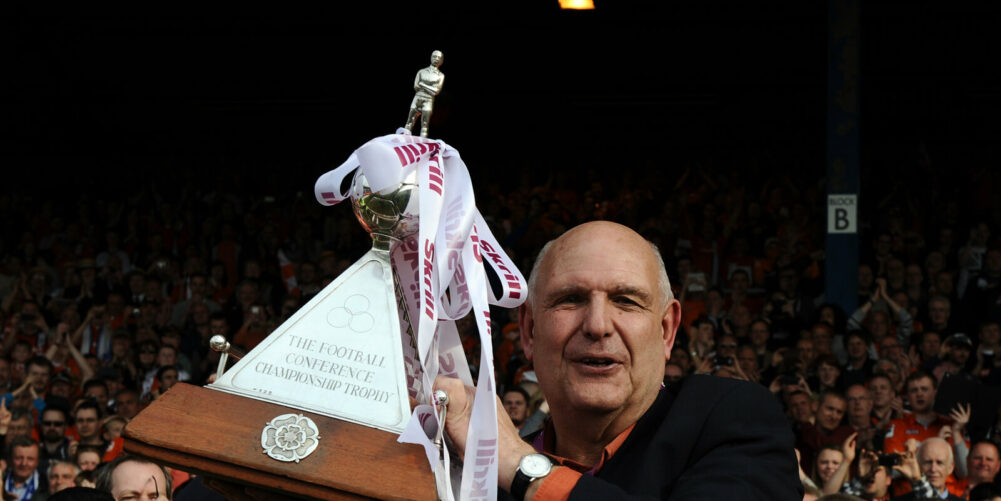STILL THE BEST: John Still was the first manager to win promotion to the Football League with three different clubs Picture: PA Images
By Chris Dunlavy
When John Still ‘retired’ from football after stepping down as Barnet boss in 2018, Paul Benson was one of the first to reach for the phone.
“I told John what a great career he’d had. What a pleasure it had been to work for him. All of that stuff,” laughs the 40-year-old, who played under Still at Dagenham & Redbridge and later Luton Town. “Two days later, he joined Maidstone!
“But that’s John, isn’t it? What would a character like him do without football? It’s been his life for 50 years and I think he’ll be involved until the day he dies.”
Craig Mackail-Smith, Benson’s strike partner at Victoria Road before forging a successful Championship career with Brighton, chuckles at this tale.
“I signed for Dagenham in 2004 and he was at it then!” says the 36-year-old. “John said to me ‘I’ve probably got another two years of this left in me then I’m off to retire in Cyprus’. That was 16 years ago, so it shows you how attached to football he is.”
Attached doesn’t do justice to Still, a man woven into the fabric of the Conference much like Neil Warnock, once a fierce rival, is synonymous with the Football League.
Forty-four years in the business. Two thousand games. Promotions with Maidstone United, Luton and Dagenham & Redbridge, the club he helped to found in 1992, helmed for a decade and improbably hauled into League One.
A love for the game that was cultivated in East End parks, honed as a schoolboy at Leyton Orient and sharpened by hours in the office of John Lyall, the legendary West Ham boss whose assistant, Ronnie Boyce, was a childhood friend.
Speaking to Michael Calvin in Under the Volcano, Still recalled those days: “John used to say to me, ‘There’s two ways to improve. You come in every day, earlier than everyone else, and you practise. Then you practise more. Or you sit in this chair, and this fella comes round with a magic wand and touches you. Suddenly you’re better. The only problem is, I’ve never f***ing seen that fella. So you’ve got to work’. I’ve used that line all my life.”
As a player, Still never got the chance to enact Lyall’s words. A serious knee injury on his first and only appearance for Orient saw to that.
But since clambering into management with Leytonstone at the age of 26, few have done harder yards. Parks pitches. Reserve games. Sunday sides; Still’s willingness to dredge the game’s deepest trenches in search of untapped talent is unsurpassed.
Benson, for instance, arrived from White Ensign at the age of 25 and within five years was representing Charlton in League One.
Mackail-Smith, who won seven caps for Scotland and moved for fees totalling £3.4m, had just been dumped by St Albans City.
Dwight Gayle, a Premier League striker, was playing in front of six fans at Stansted. Marlon King up top for Dulwich Hamlet. Gary Breen, who played in a World Cup for the Republic of Ireland, in midfield for Gillingham’s reserves.
Ken Charlery, a striker for Still at five different clubs, was one of the first to be unearthed.
“John had a great eye, and he’d do the hours,” says the 55-year-old. “Hackney Marshes, Walthamstow Marshes – if somebody was scoring goals, John would be there on an evening or a Sunday morning.
“He’d say ‘If you can score at that level, you can score anywhere because you’ll have better players around you’. Nine times out of ten, he’d be proved right.”
Benson, now a coach at Luton, agrees. “I watch players from the Premier League to Step 5,” he says. “John knows them all. I could see someone at, say, Billericay and Stilly will be like ‘Yeah, yeah, he’s a good player. Does this well, needs to improve that’. It’s incredible.”
For Benson though, Still’s great strength lies not in the mining of talent but in his ability to make it shine.
“John is good at a lot of things,” he explains. “But what made him stand out from anyone else was how he could make a player feel.
“People talk about players who need an arm or a kick up the arse. But we all need both. I’ve not yet met a player who is so confident that he doesn’t need a pat on the back sometimes.
“John’s great skill was knowing when that moment was. If I’d gone a few games and hadn’t scored, he’d build me up. But if I’d scored five or six in a row it would be ‘Remember, there’s players in this team who could take your place tomorrow’.
“And that was just me. He had a different technique for every single person and that’s a very rare skill to have.”
“He knew how to make you react,” adds Charlery. “Deep down, he’s hurting you. But he did it for the good of the team. You’d go out there thinking ‘I’ll show this b*****d’ and produce a level of performance that even you didn’t know was possible.”
Still never did stop applying Lyall’s ethos. Players who grafted but failed to make the grade were recommended to fellow managers; those who didn’t were unceremoniously cut loose.
Yet that innate ability to sense mood and personality allowed Still to adapt to the modern player in a way that many of his peers found impossible.
“The John I knew in 2005 would lose his rag, throw things around the dressing room,” says Benson. “I’ve seen him tell people they’d never play for the club again.
“But the John I joined at Luton in 2013 was far more mellow. He’d moved with the times and realised instinctively that lads don’t respond to that anymore. Again, it’s testament to his understanding of people.”
Having stepped down from Maidstone at the season’s end, Cyprus is once again beckoning for Still. Benson, though, isn’t convinced.
“He’s just got such a passion for the game,” he says. “You don’t get to Stilly’s age and achieve all he has without that. I’d be amazed if he didn’t pop up somewhere again.”





















